TIFF 2013: The Green Inferno, The Sacrament, Canopy & Oculus
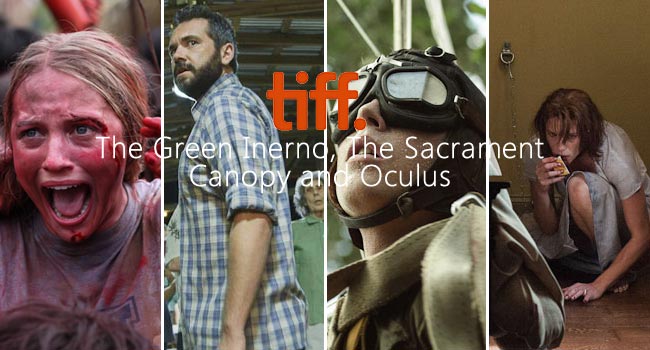
The Green Inferno
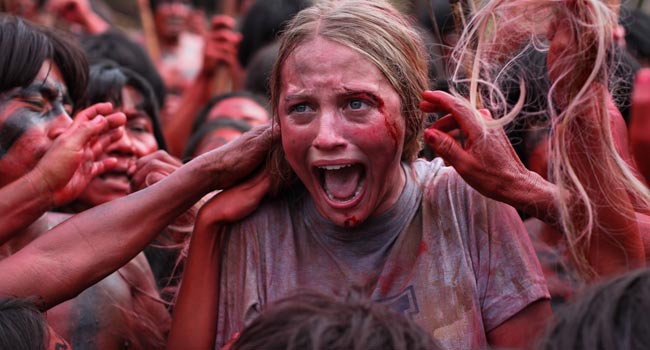
It seemed to be fate that I’d have a day devoted exclusively to genre films at TIFF. After the excellent reaction to Eli Roth’s The Green Inferno at its midnight screening, I caught up with it the next day. This time Roth decides to take on a subgenre of horror that hasn’t been touched in a while: cannibal horror. Fans of Cannibal Ferox or Cannibal Holocaust should know that Roth delivers and then some when it comes to the cannibal part of the subgenre’s name.
A group of activist students decide to fly from New York to the Peruvian Amazon and protest a corporation bulldozing a primitive tribe. Their plan is seemingly successful, but only because of their manipulating of a UN Ambassador’s daughter (Lorenza Izzo) to join the protest. On the way back their plane crashes in the forest, and soon enough they’re all kidnapped by the tribe they were protecting.
Roth has been known for his gory horror films, and The Green Inferno is by far his goriest one yet. The effects by KnB are too well-done, in that they can be downright disgusting at times. The second half of Inferno, where the cast tries to survive the tribe’s brutality, benefits from its focus on the nastiness. A few scenes are total howlers, and it wouldn’t surprise me if Roth made these with the midnight crowd in mind.
The ultraviolent second half can’t sustain the film though, and it’s more of a relief than anything considering how godawful everything before it is. Roth has assembled a cast of bad actors and bad accents, who all deliver bad dialogue. The inclusion of political commentary on activism is laughable too, but it’s not surprising since Roth has never been known for his depth. Fans of Cabin Fever and Hostel will love The Green Inferno as it has more unlikable characters getting brutally killed, but this proves that Roth can never live up to the hype he’s been building for himself over the years.
RATING: 5.6
The Sacrament
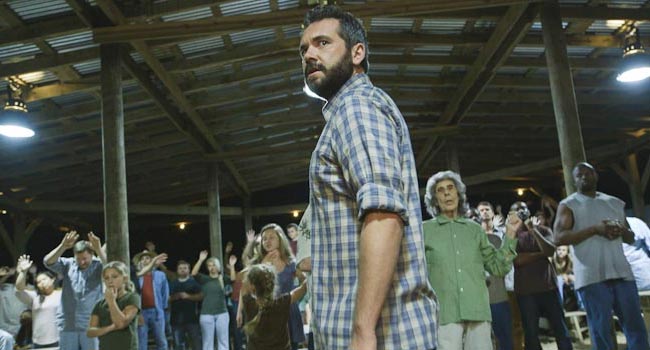
It was interesting to follow up The Green Inferno with The Sacrament, Ti West’s new film which was actually produced and presented by Eli Roth. Roth introduced the film at its TIFF premiere, telling audiences who saw The Green Inferno to “delete” that movie from their memory before The Sacrament began (I was way ahead of Roth long before he said that). West is one of the few American horror directors working today who can actually make something scary, and he continues to prove that with his latest film. It’s a lesser work in comparison to the rest of his filmography, but it’s still a creepy little horror film that stays consistent with West’s work up to now.
The Sacrament is framed as a documentary by VICE Magazine. Opening with a text crawl that explains the term “immersionism” and how it relates to VICE, correspondent Sam (AJ Bowen) explains how his friend Patrick (Kentucker Audley) received a letter from his sister (Amy Seimetz) talking about a religious group she joined that moved from the US into an unnamed country. Patrick accepts her invitation to visit the compound, taking Sam and a cameraman (Joe Swanberg) along without telling them.
Ti West is clearly obsessed with Jonestown, and The Sacrament essentially is a Jonestown movie. I assume that legally he couldn’t adapt the true story, but he follows the basic facts of what happened in Guyana closely. The modern setting and use of a camera crew puts a spin on it, along with a few other dramatic liberties West takes, but for anyone who has heard of Jim Jones it will be very easy to know where things will go.
Amazingly The Sacrament still worked for me despite knowing everything that would happen. This is because the events at Jonestown are so horrifying that the first two acts are filled with dread at what’s about to come. West plays into that too, periodically dropping some moments in that show something is seriously wrong with the compound. Once cult leader Father (Gene Jones) shows up to do an interview with the documentary crew, The Sacrament begins firing on all cylinders. Jones is fantastic as Father, with the interview sequence showing just how charismatic and dangerous he is as a character.
Soon after the interview things begin taking a turn for the worse, making way for the intense and disturbing final act. With The Sacrament West intelligently uses the mockumentary (calling it found footage wouldn’t be entirely accurate, as West said himself at the Q&A) format, creating a realistic what-if scenario of Jonestown if it happened today. He also stages some seriously impressive sequences, using long takes and stationary shots to pull off some truly disturbing moments. The Sacrament might not quite be a breakout for West, as the concept might not fly with mainstream audiences, but it still establishes him as one of the only consistent horror filmmakers working today.
RATING: 7.1
Canopy
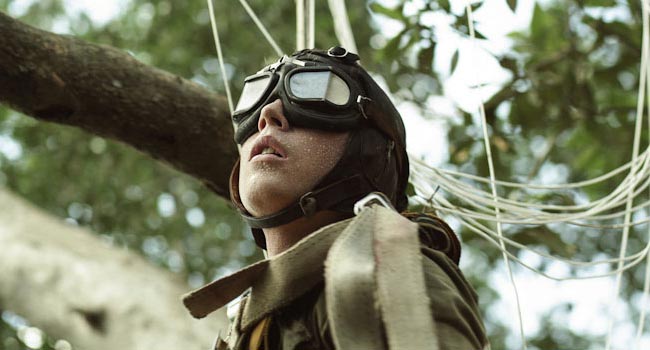
Part of me wanted to describe The Sacrament as a minimalist film for its genre, but after seeing Aaron Wilson’s Canopy, Ti West’s film looks insanely busy in comparison. Running at just under 80 minutes, Canopy is a very simple feature that sometimes thrives off of its no frills approach.
In the jungles of Singapore during World War II, an Australian pilot (Khan Chittenden) crashes his plane. Waking up hanging from a tree, he stumbles around the jungle trying to avoid Japanese soldiers. He eventually runs into a Chinese resistance fighter (Tzu-Yi Mo) who is hiding in the jungle for the same reasons. From there the two of them team up by pure necessity, trying to escape without being spotted and killed.
The one thing everyone will mention about Canopy is its gorgeous technical work, and it deserves the praise. With approximately 6 or 7 words spoken in the film, the visuals and sound end up doing most of the heavy lifting. The locations are gorgeous, and cinematographer Stefan Duscio provides an abundance of gorgeous images in the jungle setting. As nice as the visuals are, the real winner here is the sound design. It’s obvious that a lot of care went into providing the soundtrack to Canopy, and the results can be heard. It’s completely immersive, and when Wilson decides to throw in a few expressionist sequences the visuals and sound work together quite well.
With all that said, Canopy‘s simplistic approach ends up being more of a detriment than a benefit to the film. As accomplished as the film is technically, the main relationship doesn’t feel natural in the slightest, and the whole thing feels very slight by the time the surprisingly abrupt ending comes around. Canopy functions as a good way for Wilson to establish himself as a talented director and craftsman, but there’s very little to go on other than his technical skills. Hopefully with a follow-up feature, Wilson can show that he can create some substance to match his style.
RATING: 6.5
Oculus
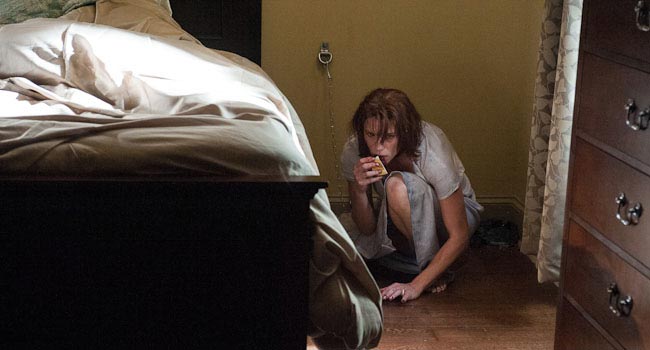
My day ended at the World Premiere of Mike Flanagan’s Oculus. It was midnight, and the crowd was rowdy and ready to go once programmer Colin Geddes introduced the film. It was a bit of a surprise then that, other than some applause for a few sequences here and there, the crowd was dead silent through most of the film. That speaks to the power of Flanagan’s film, which is a terrific horror movie and the most entertaining film I’ve seen up to this point.
Kaylie (Karen Gillan) and Tim (Brenton Thwaites) are siblings who haven’t recovered from their parents deaths 11 years ago. Their father (Rory Cochrane) tortured and murdered their mother (Katee Sackhoff) before Tim shot and killed him in self-defense. The incident put Tim in a mental hospital for a decade, and the film starts with him getting released from psychiatric care at age 21. Kaylie tells him upon his release that she’s found the cause of their parents deaths: The Lasser Glass, a centuries-old mirror in their childhood home that supposedly drives its owners to harm themselves and others.
Kaylie and Tim bring the mirror back to their childhood home, with Kaylie setting up an elaborate plan to prove the mirror’s sinister influence and destroy it once and for all. Oculus, which was adapted from Flanagan’s short of the same title, ports over the same sequence from the original short almost word-for-word: A long, exposition-filled monologue explaining the mirror’s history along with all of its victims. This sequence, which is excellently done in both films, gets to the heart of what makes Mike Flanagan such a terrific horror director (Note: I’m a big fan of Flanagan’s past work, and I included his film Absentia on our Great Horror Films You Haven’t Seen feature). He knows the power of a good, well-developed backstory, and viewers will eat up the extensive history of the haunted mirror.
And for most of Oculus, the creep factor comes from discovering just how powerful the Lasser Glass mirror truly is. The mirror’s power is entirely through screwing around with people’s perception, and its manipulations are so extensive that by the end of the film it’s hard not to be freaked out.
Flanagan and Jeff Howard’s screenplay is a truly rare thing in the horror genre: It’s smart. The film crosscuts between Kaylie and Tim’s present-day battle with the Lasser glass and what happened to them as children. At first this seems like an odd choice, given that we’ve already been explained about what happened to their parents from the beginning, but by the final act it comes together in a truly effective way. Without giving away too much, the mirror’s distortion of perceptions eventually merges the two timelines in a way that’s so seamless it’s hard to notice exactly when the changes occurred. It’s an inventive way to change up the cross-cutting, and watching it in action makes for a truly admirable site. I can’t think of the last time a horror film used a single location so well, or had a structure so ambitious.
Admittedly there is a little bit of a cheese factor here, mainly with some ghosts that don’t have the same chilling impact as the scenes where people get tricked by the mirror, but it isn’t distracting enough to bring things down. Oculus is a truly rare horror film these days: one that’s truly original, with a great screenplay and some legitimately unsettling moments. It currently does not have distribution but it’s the best horror film I’ve seen this year, and I have a good feeling that it will stay on top at the end of 2013. In my write-up for Absentia I said that, with a bigger scale Flanagan might deliver something truly special. After seeing Oculus I’d say he delivered on that promise, and then some.
RATING: 7.5
Stay tuned for an interview with Mike Flanagan
Next up:
I start the day with Kelly Reichardt’s Night Moves before moving on to the follow-up from the director of Revanche and Jonathan Glazer’s Under the Skin. And oh yeah, I squeeze in some time for a little film playing here called Gravity.
